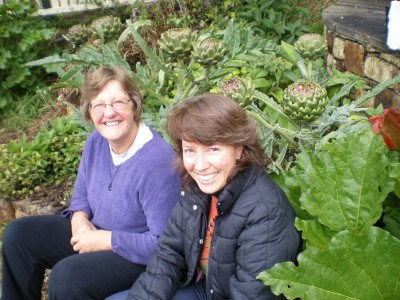Boosting local business isn’t just a way of reducing our carbon footprint. It’s also an essential step in making economies everywhere more able to resist downturns. [28 July 2009 | Peter Boyer]
For all the talk about how we should consume less, stay at home and grow our own food, money still makes the world go round. But while the big end of town continues to get all the headlines, increasingly we’ll be looking to small, local enterprises to keep our communities afloat.

Juliet Chapman (left) and Christina Guidici enjoy the fruits of their labour.
It seems a simple proposition that to survive the climate challenge we need to develop greater local resilience and autonomy, but before this transition can begin to take hold there are some curly questions that need answering.
Questions like: How do we shake off the habits of a lifetime of supermarket specials and get stuck into growing food in the back yard? Is there money to be made here?
This isn’t yet headline-grabbing stuff, so you won’t read too much about how voluntary groups in Tasmanian cities have already helped people to turn their quarter-acre blocks into mini-foodbowls, and established community gardens and produce markets. This is a revolution in the making.
That’s good, but it would be even better if people could make a living from this work. For a start, what if councils used planning frameworks to encourage a return to market gardening on unused urban or urban fringe land, or to prevent new subdivisions taking over fertile acreages?
Here’s another promising possibility, the brainchild of two enterprising, green-fingered women living in southern Tasmania, environmental scientist Juliet Chapman and Christina Guidici, an agricultural scientist. They’ve hit on something that’s both as old as civilisation — making gardens to grow food — and brand new.
What’s new about their idea is that they’re building a business to channel and develop people’s wish to grow food by providing expert advice, plant seedlings and, if customers want it, physical labour to set up a working, productive garden a hop and a jump from the back door.
They provide on-the-spot answers to questions like when should I plant asparagus? What does my soil need to make it more fertile? What should I put in the compost? Should I keep a garden diary? Their aim is to create independent gardeners, no longer needing people like themselves.
With current buzzwords like autonomy and resilience and neighbourhood, their business name is to die for: FIMBY (www.fimby.com.au) — for “food in my back yard”. How fitting is that?
More questions: If we grow our own food and barter what we don’t need, how will local stores stay in business? How can we get people to buy local when imported goods are so cheap, and how can big supermarkets be persuaded that importing food and screwing local suppliers is bad practice?
I don’t have ready answers, but coalitions are building around Australia that are taking us down that path. Extending well beyond neighbourhoods to regional and even national coalitions, these groups are working to an organising model developed by the American Independent Business Alliance and adapted by other US-based bodies, including an organisation called BALLE, the “Business Alliance for Local Living Economies”.
BALLE started in 2001, when a café owner and better food activist named Judy Wicks teamed up with a campaigner for responsible business, Laury Hammel, to persuade local businesses throughout North America “and beyond” to begin grassroots action to localise their economies.
They were quickly joined by economist Michael Shuman and author David Korten, both established writers and advocates for a community-based response to the globalised economy, who added their broad-scale vision to the energetic, effective local activism of Wicks and Hammel.
BALLE now comprises over 20,000 businesses in the US and Canada, and is expanding its horizons abroad — as far as Tasmania, where Michael Shuman recently made a compelling case that the best way to build a robust economy is to strengthen local business. Amen to that.
